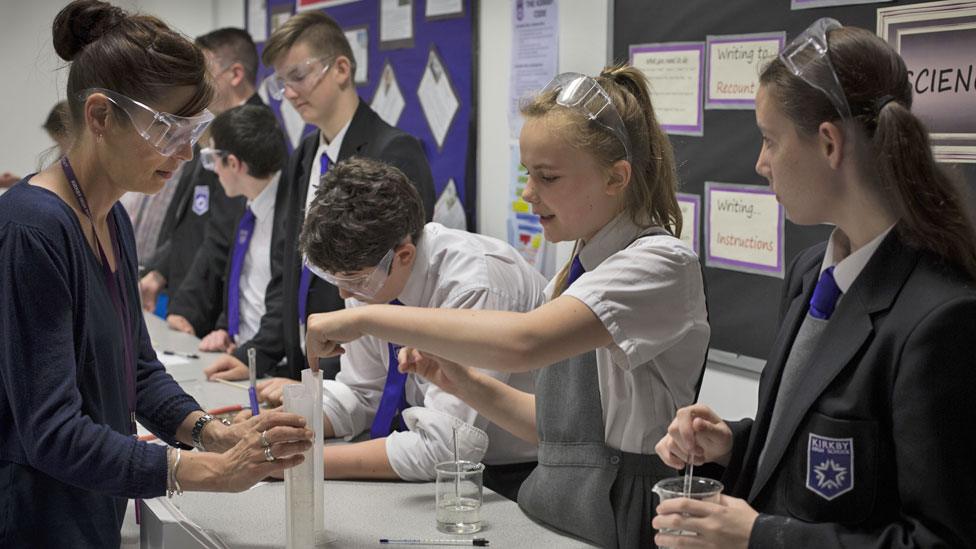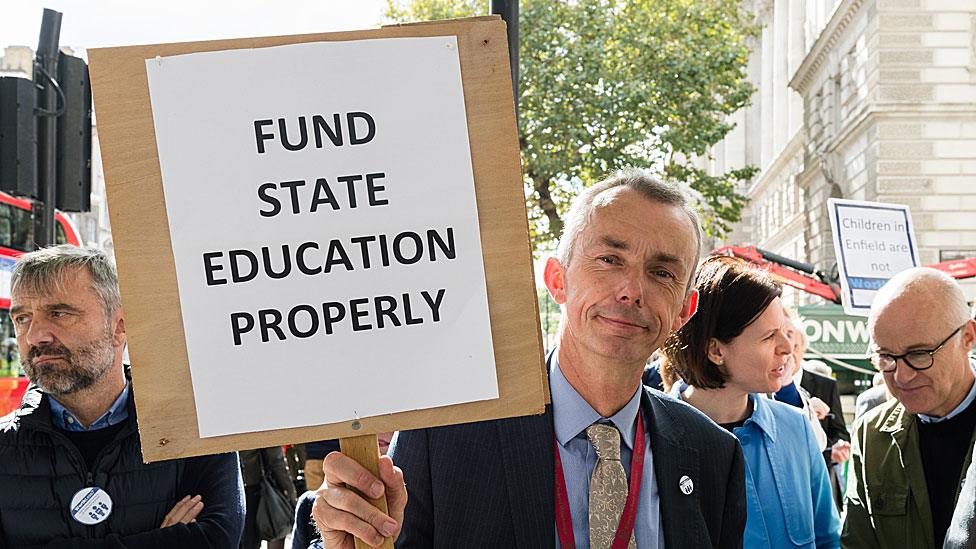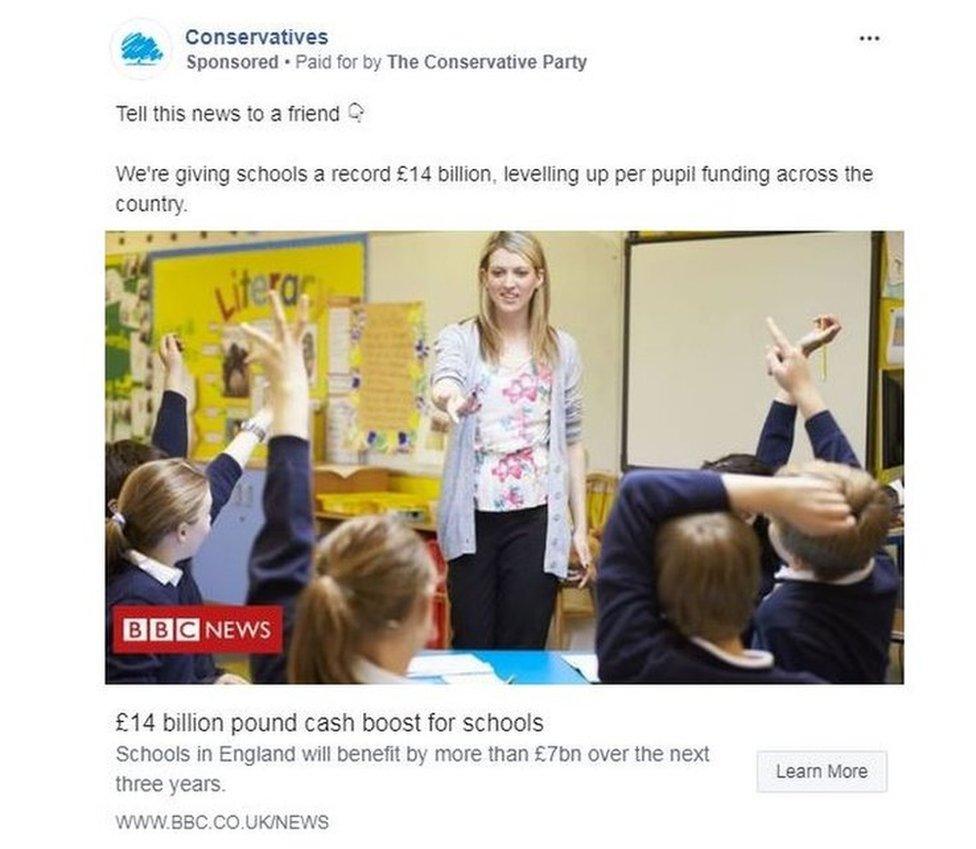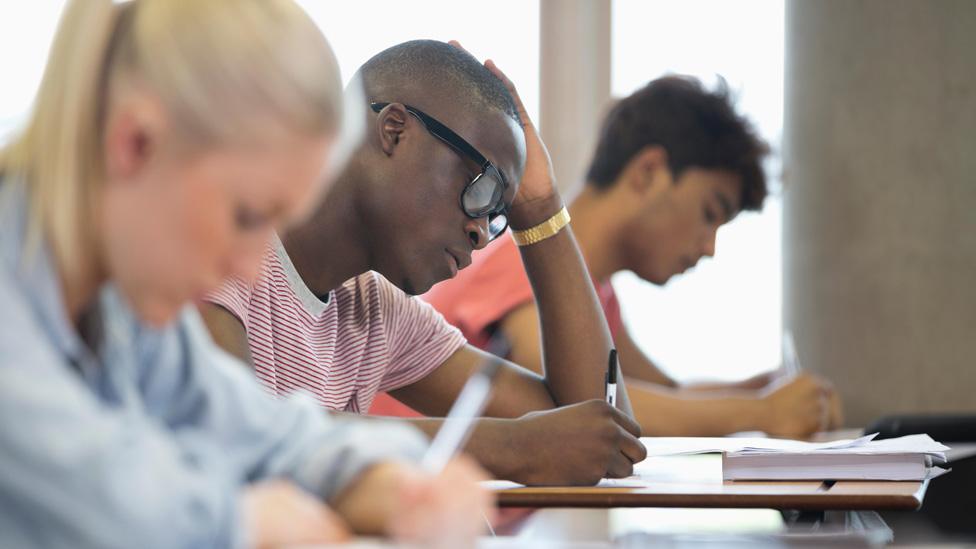Extra school cash 'enough to reverse cuts'
- Published
- comments

School funding cuts in England will be reversed if the government's three-year spending plan is implemented, an independent analysis of education budgets says.
The Institute for Fiscal Studies says this would return funding to the levels of 2009.
But the think tank says in effect this would be a "13-year real-terms freeze".
The government made a priority of school funding in its spending review - promising an extra £7.1bn by 2022-23.
Prime Minister Boris Johnson, when the extra cash was announced, said he wanted to "ensure all young people get the best possible start in life".
"That means the right funding," he added.
Head teachers' leader Geoff Barton said the analysis "provides a sober assessment of the government's hyped-up announcements over education funding".
The overview of education budgets, commissioned by the Nuffield Foundation, shows some of the winners and losers in £91bn of spending last year.
Half full or half empty?
The highest-profile political battles on education funding have been over school budgets.
After long-running campaigns by school leaders over funding shortages, Chancellor Sajid Javid's spending review promised £7.1bn extra in three years.
The IFS study says when inflation is taken into account, this is a real-terms increase of £4.3bn, enough to reverse an 8% reduction in per pupil spending.
Whether this is considered adequate seems to be a case of either looking at the glass as half full or half empty.

Head teachers have been protesting about funding shortages - and are now considering the promise of extra cash
It is a very significant increase, particularly when compared with a decade of sliding budgets.
Almost unnoticed was another big commitment - with the government promising to pay an extra £1.5bn per year towards rising teachers' pensions costs.
But the financial analysts say, taking the long view, funding being no higher than a decade ago still represents an "unprecedented period without growth".
Jules White, the West Sussex head who has co-ordinated funding protests, said schools had welcomed the announcement of more cash but were still on a "high state of alert" about what it might mean in practice.
The Department for Education said the "biggest cash boost for a decade" helped "productivity, improves social mobility and equips children and adults with the skills and knowledge they need to succeed".
£7.1bn or £14bn?
This funding promise has become bogged down in a "fake news" controversy over the size of the increase.
The chancellor specified £7.1bn - but a Conservative advert on Facebook altered a headline on a BBC News story to make the claim the increase was £14bn.

A Conservative advert on Facebook, now removed, added the figure of £14bn school spending to a BBC News story
Facebook has since removed the advert for breaking its rules.
The IFS says school funding would increase from £43.5bn in 2019-20 to £50.6bn in 2022-23.
Luke Sibieta, research fellow of the IFS, said using the figure of £14bn was "double counting".
"Presenting figures in this misleading way is never useful. It's also totally unnecessary in this case, as the actual funding uplift will be genuinely substantial," he said.
Early years - more money, shifted towards working families
Early-years education would see a spending increase of 140% compared with 10 years ago, the report says.
This mostly reflects more young children benefiting for more hours, rather than a per child increase - such as the introduction of 30 hours of free childcare for working parents.
But the IFS says there would be a "strong shift" in direction, with more support targeted at working families rather than those on low incomes.
Further education and sixth-forms - the most squeezed
Further education and sixth-forms did not have the same protection from austerity measures as the core school budget - and have faced the most financial pressures.
And despite promises of more support, the IFS says they remain "severely squeezed".

Further education has seen a worse squeeze on funding than schools
Since 2010-11, the report says, per pupil funding has been cut by 23% in school sixth-forms and 12% in further education and sixth-form colleges.
Even with the spending review promising more cash, it would still leave this post-16 sector down by 7% on 2010. The IFS says it would take another £1.1bn by 2022-23 to reverse cuts to this sector.
Universities - there may be trouble ahead
Despite many upheavals, there is a hierarchy of spending that continues unchanged - higher education receives more per student than any other part of the education system.
Each cohort of student costs about £17bn - with about half paid back by graduates in loan repayments.

Tuition fees have been frozen in recent years and the IFS says income per student has fallen by 5% since 2012.
But to put that it context, the report says this still gives universities 50% more per student than a low point for funding in the mid-1990s.
Looming on the horizon is whether the government will implement the report from Philip Augar, calling for tuition fees to be cut to £7,500 per year, rather than the current £9,250.
Labour is promising to scrap fees completely, which the IFS says would cost the public finances £6bn per year over the long run.
Education falls behind health spending
Every government says it wants to invest more in education - but taking the longer-term view, the IFS says that in terms of a share of national income, spending "has not risen since the early 1970s".
The analysis says over the past 50 years, it has moved between 4% and 5.5% of national income.
"This contrasts sharply with health spending, which has nearly doubled as a share of national income since the early 1970s, from about 3.5% to over 7% of national income," it says.
- Published4 September 2019

- Published30 May 2019

- Published17 September 2019
